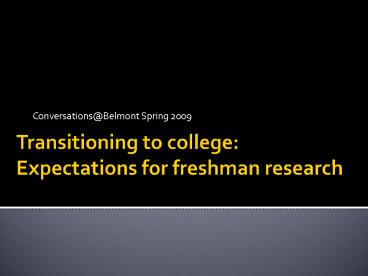Transitioning to college: Expectations for freshman research - PowerPoint PPT Presentation
1 / 18
Title:
Transitioning to college: Expectations for freshman research
Description:
Gwen Hines, John Overton High School. Jeanette Lambert, Pearl Cohn ... Online Catalog. Periodical Databases. Search Strategies. BILS Tutorial. Ultimate goal: ... – PowerPoint PPT presentation
Number of Views:42
Avg rating:3.0/5.0
Title: Transitioning to college: Expectations for freshman research
1
Transitioning to college Expectations for
freshman research
- Conversations_at_Belmont Spring 2009
2
New Steering Committee!
- Judy Bivens, Trevecca Nazarene University
- Alice Bryant, Harpeth Hall
- Brenda Gideon, Franklin Road Academy
- Gwen Hines, John Overton High School
- Jeanette Lambert, Pearl Cohn High School
- Joan Lange, John Paul II High School
- Hannah Little, Webb School
- Courtney Stephens, Belmont University
- Jenny Rushing, Belmont University
- Stephen Womack, Franklin High School
3
Center for Innovative Educators
- Donna Clark, Harpeth Hall
- https//www.harpethhall.org/podium/default.aspx?t
36644rid1564
4
Welcome FYS and FYW faculty!
- First Year Writing
- Linda Holt, English
- Caresse John, English
- Andrea Stover, English
- First Year Seminar
- Mike Pinter, Math
- Regine Schwarzmeier, Foreign Languages
5
Information Literacy_at_Belmont
- IL is a university learning goal
- Integrated into General Education
- Freshman Courses
- First Year Seminar and First Year Writing
- Junior Courses
- Third Year Writing and Junior Cornerstone
- http//bunchlibrary.pbwiki.com/InformationLiterac
yAcrosstheCurriculum
6
First Year Seminar
- Each section has its own sub-topic which
focuses on some aspect of ways of knowing - Goals intellectual inquiry, critical thinking,
and drawing connections - Common assignment argument paper
- Course descriptions
- http//www.belmont.edu/bellcore/pdf/CDFall08.pdf
7
Argumentative Paper
- Must include at least five substantial sources,
which relate, in a credible way, to the research
paper/project. These (library and/or internet)
sources must be researched by the student, not
provided by the professor or extracted from the
regular course readings. - Must make intentional use of the sources in the
argument
8
Argumentative Paper
- Must take an informed position on a complex
issue/topic - Must introduce and carry through an argumentative
thesis - Must conduct argument in such a way that
demonstrates awareness of complexity of topic
9
Argumentative Paper
- Must take audiences needs into account i.e.
argument follows logical sequence, transitions
are used to guide reader, tone is measured and
reasonable, etc. - Must draw paper to a logical and effective
conclusion
10
First Year Seminar IL instruction
- Research Process
- Preliminary research
- Narrowing the topic
- Formulating the research question
- Types of publishing
- Scholarly
- Popular
- Trade
- Evaluating articles
11
First Year Writing
- students practice recognizing, evaluating, and
constructing written arguments, in the process
developing their reading and research skills.
12
FYW Research
- One major assignment should involve secondary
research how to conduct library research how to
conduct Internet research how to evaluate source
materials (particularly those resulting from a
search of the World Wide Web) how to integrate
summaries, paraphrases, and quotations into the
text of a research paper how to document source
materials.
13
First Year Writing IL instruction
- Fundamentals of using Bunch Library
- Online Catalog
- Periodical Databases
- Search Strategies
- BILS Tutorial
14
Not just a library thing
- Ultimate goal
- Together, librarians and classroom faculty can
prepare students for lifelong learning.
15
- Information literate people are those who have
learned how to learn. - They know how to learn because they know how
knowledge is organized, how to find information,
and how to use information in such a way that
others can learn from them.
Source ALA Presidential Committee on Information
Literacy
16
ACRL Standards
- Identify the information need
- Find needed information
- Evaluate information
- Use information effectively
- Use information ethically and legally
17
Challenges
- Overestimate search skills
- Reporting syndrome difficulty narrowing a topic
and posing researchable questions - Unfamiliar with academic publishing process and
how to evaluate sources - Hard time synthesizing information from various
sources - Plagiarize unintentionally-dont know the rules,
how to paraphrase, or take notes
18
What information literacy skills should freshmen
have?
- What skills do they actually have and what do
they lack? - Are they prepared for freshman level research
projects?































